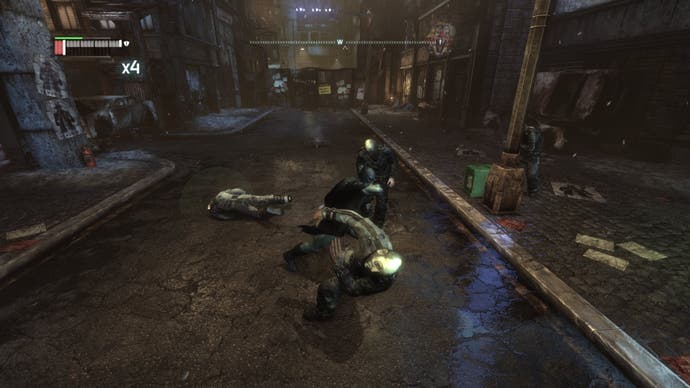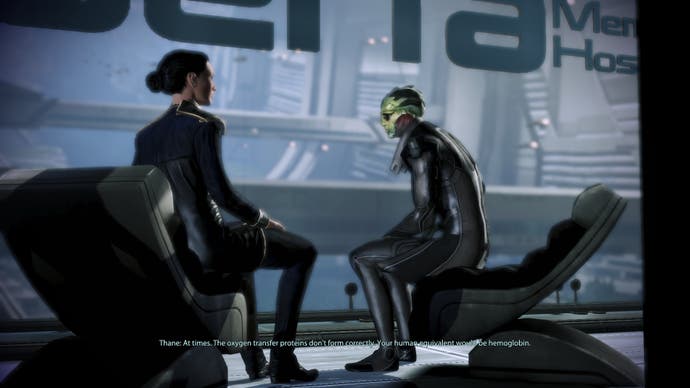Saturday Soapbox: Gameplayed
This time, game plays YOU.
"Keep walking, asshole, before I shove this nightstick where the sun don't shine."
Rude, abrasive, unnecessary. It's all of these things, but I'd let it go, just because it's a hell of a lot of hassle to do anything about it.
But I do a double take. This is a policeman. A PoliceMAN. I'm Johnny Motherf***ing Klebitz. I'm part of The Lost and the Damned, whose entire purpose is to F*** the MAN. I'm not going to let this slide.
So I show him how you really use a nightstick.
"Keep walking, asshole, before I shove this nightstick where the sun don't shine."
Rude, abrasive, unnecessary. It's all of these things. And I should let it go, because I don't need the attention of the police right now, not when everything is falling apart around me right now. I'm Louis Lopez, and I keep on walking, because I really don't need this.
GTA 4, more than any other game I've played, places you in such a convincing, intricate role and world that you can't help but play it like you're meant to. These characters you're given aren't arbitrary or haphazard; they're crafted with an attention that borders on the absurd, so that when you're walking down the street in Alderney or Algonquin, you react to people just as much as they react to you.

It's this notion of a game subverting and manipulating you into performing in a certain way without forcing arbitrary restrictions upon which really interests me. It's a moment of reciprocation; just as you play the game, so the game is playing you; it's driving you to act more like your character, and less like yourself. By allowing you to detach yourself from what you would do, it enables you to see what you could do.
Another example is Batman: Arkham City. It was a game less about winning your fights and more about winning your fights as Batman would. It rewards you for flawless combos and acrobatic displays of violence, while punishing you if you let any of the pathetic brutes hit you. As such, you only really enjoyed yourself when you were acting as Batman would act, rather than how you would act.
The same applied to the stealth sections, allowing you to dispatch of your enemies remarkably easily, but with that ease came a sort of bored complacency; it's only when you start to mess about with your prey that things got interesting.
Until the most recent iteration of the GTA, there was no effort really placed in making you engage and empathise with your character, to the extent where going on a rampage felt like a completely understandable thing to do. You were playing an amoral arsehole, and so being an amoral arsehole was fine. That we didn't really stop to look around and question why it was quite so much fun being an amoral arsehole is besides the point; it was an available and viable option, so we made use of it.
Do the same in GTA 4 and things get a little bit murkier. Niko Bellic has a history of violence, including against innocent civilians, and he's such a broken, empty shell of a man that, if you do go on a rampage, it feels wrong. Rockstar has successfully injected morality into their franchise, to the degree where one of the most controversially violent and amoral games in the history of the medium is suddenly using abstract values to punish the player for the most famous aspect of the game.

When we play games we rarely move away from our own inclinations. We act through the avatar we're presented with, but it's a rare occasion that they have any considerable influence on the way we act. In fact, in some games, you're actively encouraged to make as big an imprint on your character as possible, such as Skyrim or Fallout. A blank slate for you to scrawl on, write out your adventures and quirks.
And that's fine, but at the same time the question rises about whether that's really where we want gaming to be taking us. Escapism is a driving force in gaming, but, up until very recently, we've yet to be presented with many opportunities to escape from ourselves.
Or, at least, opportunities driven by the developers. You can play Skyrim like the fantasy bastard you quite clearly aren't, and there's a great deal of engagement to be taken from such an attitude. The problem is, because it's not specifically intended to be played that way, it rarely has as much of an impact as we'd like. You're always going to save the world in Skyrim, and steal as many hats as you can get your hands on; it's just the details of the journey that can change.
Back to Johnny Klebitz. He's presented in such a way that you can't help but empathise with him. Sure, he might be on the fringe of the law, living like a wild child and beating the crap out of anyone that looks at him the wrong way, but at the same time he quite clearly has a deep and important friendship with his 'Brothers', and wants to avoid unnecessary conflict. The ideology surrounding the Lost and the Damned is compelling enough that, when a policeman hurls abuse your direction, you don't think too long about whether to make him regret it.
It's a step, but games have gone further. Mass Effect might be over, but through the game you've been cultivating your own story, making choices and dropping one liners at just the right moment for maximum satisfaction as your choice of Shepard. It's a particularly interesting example because you're given so much lateral freedom with the creation of your Shepard, but, when it boils down to it all, you're still the Shepard; you do the same things, in pretty much the same order, as everyone else. It's the details that change, and they change because of a thousand little things Bioware chooses to give you the option to impact.
It's your fault that whoever died in Mass Effect 2 died in Mass Effect 2. You made the wrong choice sending Miranda to hack the terminal, because she's not got the same technical know-how as Tali or Legion. You shouldn't have sent Mordin with the other group, because he's not as good a leader as Garrus or Grunt. They're choices that you make, but it's the game that's throwing up the scenario that forces you to make that choice. And then it forces you to live with the consequences of those choices.
And you're given little choice but to accept those screw-ups and move on. Mass Effect 3 is the culmination of your choices in the previous games, for better or worse, and you've created your identity out of the events and failures that your Shepard has experienced on the way. You may have started off as the same Earth-Born Survivalist as a sixth of all the other players started off with, but there are a few dozen moments where your path has diverged, and you're left with someone unique.
But, most interestingly, someone unique that's not you. A separate entity that you've helped craft as much as the game has. You've got history, a character background that you've helped craft.
Mass Effect 3 is a collaboration between Bioware and the player in a way that no previous game has ever attempted, let alone pulled off. The decisions you make during the conversations in Mass Effect 3 are informed by the choices you've made leading up to that point, a laundry list of choices and consequences that mean that you might decide to, finally, not punch the reporter in the face and this time actually give her a quote that will help the war effort. Because right now, after everything you've been through, you're bigger than that.
It's this level of involvement with the game's characters and motivations that I want to see utlised in every game. Of course they can't all spend forty hours establishing a backstory with you, but if GTA 4's expansions can have a strong enough sense of character to influence whether I visit bodily harm on a policeman, you don't need forty hours. I want games to create a compelling enough universe that it feels natural to behave, not as myself, but as the character I'm given to play. I want to be an actor who's been given the free will to decide which direction the play gets to go.
Frankly, I'm bored of being me. Let's try on someone else's meatsuit.




-3-31-23-screenshot.png?width=291&height=164&fit=crop&quality=80&format=jpg&auto=webp)




